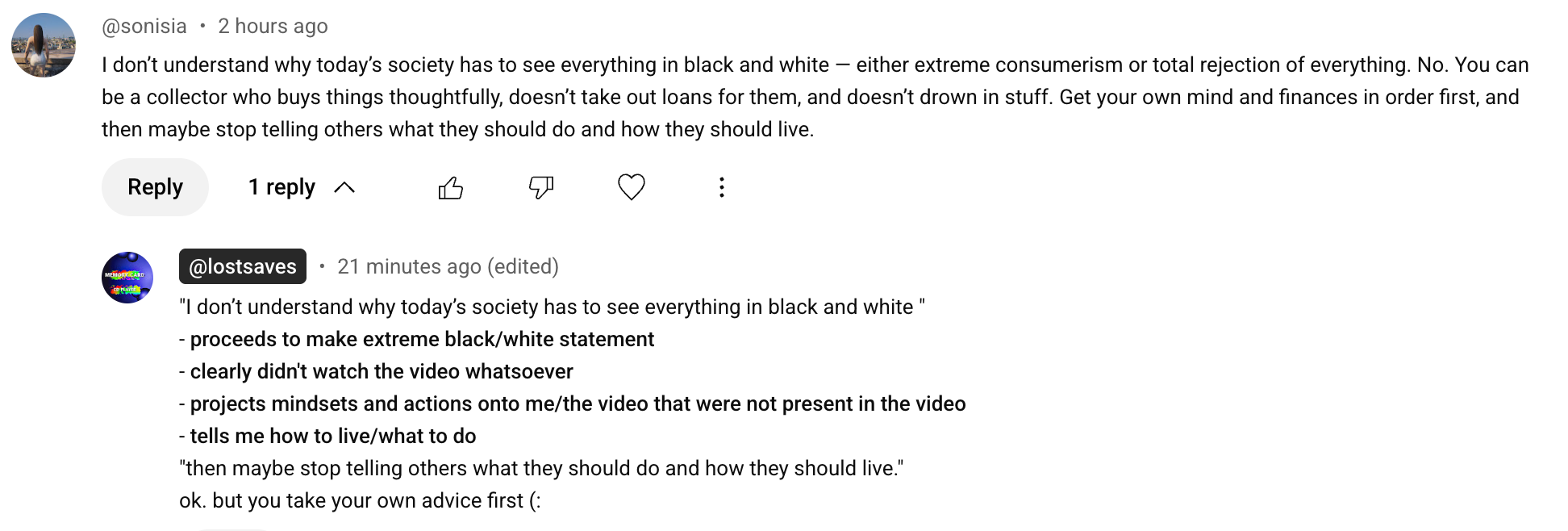YouTube comments are actually just a comment for oneself

Something I’ve had to learn about YouTube comments is that they aren’t really comments on the video. At least, not most of the time.
Sure, someone might have a truly worthwhile observation or discussion in response to what a video says - this is especially true with long-form content like my podcasts. But most of the time, the comments are… about anything else.
Sometimes, someone has a gut reaction about me: My appearance, my choice of hair or nail color, my specific haircut, my beard (or lack of), what I wear, my backdrop, etc. Sometimes, it’s purely a response to the title of the video, without having watched (or, at least, absorbed) a second of it. Sometimes the comment is about other things I cover/have covered, but not what’s in the video itself.
And sometimes, a YouTube comment is just about the idea of the video, but not the video. (And often, still having not watched it.)
For example, if I make a list video of games, comments will often pour in mad that I didn’t include X, Y, or Z game - ignoring any hence of “why.” I could make a list video of my favorite games I specifically played in my room on this one specific console when I was specifically 8 years old, and someone will still comment mad that I didn’t include this other game that I hadn’t played at 8 years old or in my room (or maybe wasn’t even on that console).
The comment section is for people to yell into the void and argue with themselves.
In the above comment, perhaps the person took the title too literally (I could write at length about the fixation on hyper-literal interpretations of YouTube titles and how absolutely unproductive that is) and only responded to that. Or perhaps they did manage to watch the video, but somehow didn’t absorb any of my own obvious intentions, messaging, or positioning in the video.
Instead of arguing with what I did or what I said or my intentions with the video, they’re instead arguing with this broader trend or idea that they’ve aggregated from a myriad of other discussions similar to mine and decided to post it as a comment on my particular video. Even though the things they’re arguing against are incongruent with the ideas posed in my video.
Now, this is a pretty easy problem to solve: Just stop reading comments. Or stop reading them so closely, stop taking them seriously, definitely stop responding to them, etc. Limit YouTube comment checking to a specific time and place and don’t let it bleed into the rest of your day.
Easier said than done.
In many ways, YouTube comments are the only real way to judge performance and sentiment about a video. We have a sea of analytics available from YouTube, but they don’t really paint a productive picture.
Secondly, YouTube comments are often the only way to connect with people around our work. Especially as broader social media spirals into more of a hellscape every year, the comment section is the primary place discussions are going to be had about your video. Sure, I could use the added friction of someone needing to discuss it on social media, in my Discord server, here in the forums, or by reaching out directly as a filter of sorts to filter out the low-effort abrasive comments - but that often leaves little interaction. It doesn’t feel good to fish for compliments about your own video or try to convince other people to talk about it.
This also all stems from be coming up during a very different era of YouTube - one where comments were more personal and nicer, more important in the grand scheme of things than they are now.
Part of it is also my own literal interpretations. To me, a comment on a YouTube video should first be taken as a direct comment about the video unless made clear otherwise. I imagine a lot of viewers/commenters don’t use it that way. I’ve established as such already, yet that is still the only framework I can apply the initial read of any given comment to - given that is the vehicle they chose to send their message with.
The internet really fell apart when we all stopped using individual tools for their given purpose. When we stopped treading comment sections (on anything) as a direct line to the author of the work, when we stopped using search engines for search, when we treated social media as the “everything box” and started expecting every single-purpose service to offer every service around.